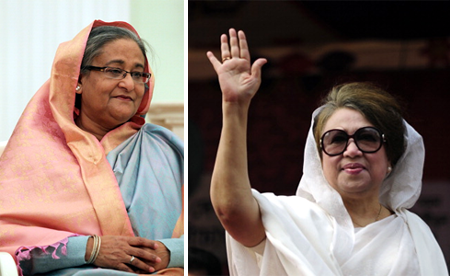Apr 15, 2025
Apr 15, 2025

So after nearly a decade Sheikh Hasina and her arch-rival Khaleda Zia have finally spoken, the call itself is as astonishing in its taking place at all as for its comment. These two titans of the Bangladeshi political landscape whose careers are so entwined share so much history, so much animosity and yet are both fervent patriots. Both are remarkable figures in their own right, each has been insulted and traduced at various times and seem the stronger for it, and both have suffered more than their fair share of bad advisors.
Sometimes it is as if they are destined to conduct a perpetual shadow dance, where they try to become ever more defiant of the other, only to find that their political twin mirrors the other’s every move. Bangladesh is of course transfixed. Outsiders look on with a degree of puzzlement and meanwhile the country suffers as this drama continues with neither party wishing to manifest signs of weakness.
If only Rabindranath Tagore were alive to write a poem about this epic struggle, he would surely do it justice, he would capture the futility, the pride, the tragedy of what is playing out for all to see. Tagore would recognize that for all the spectacle there is a price to pay and that it is the country that is paying the price in disunity, enmity and blood. This national agony that we are witnessing has to end.
In making the telephone call Sheikh Hasina has tacitly admitted that things cannot go, whilst in taking the call Khaleda Zia is acknowledging that things are indeed perilous. Both have their positions and appear unwilling to give ground, yet both are aware that the poisonous standoff cannot be allowed to continue. Either there is progress and resolution, or the country will be thrown into a turmoil that could unleash powerful and unforeseen forces that will result in further deterioration and death. Democracy itself is on the line and it is democracy that needs to triumph. As Prime Minister Sheikh Hasina should always strive for the greater good. Delays and procrastination are not the answer.
The offer of dialogue is a start and Sheikh Hasina deserves credit for that, no matter how late in the day it may have come. Any olive branch at this juncture is welcome. Khaleda Zia as the Leaders of the Opposition is bound to want to strengthen her own hand and whilst the three day national strike may indeed do that, she and her advisors must remember it is a strike about preserving democracy not about delivering power to any one individual. History tells us that agitation and aggression have a habit of getting out of hand. Bangladeshi is sorely in want of those who will calm things down, not stoke the fires of irrationality and communal mistrust. It is evident that militants and extremist elements are waiting in the wings to exploit a situation that is already highly charged and in real danger of causing a national conflagration.
The issue now is one of the electoral timeline. Further slippage cannot be permitted. If it means that an interim caretaker government is assembled headed up by a non-partisan member of the judiciary so be it. Whilst not ideal, it could at least take some of the heat out of things. This will ask much of both of the major leaders and their advisors. Some will fear losing power and advantage, whilst others will prefer to press home their suppose advantage. The hawks will not want to give an inch, as for the doves, well at present they appear few and far between. The Judiciary should ready themselves to do what they have been trained to do, be objective, impartial and sagacious. This will be a Herculean task as conspiracy and counter conspiracy have created a veritable maelstrom that appears to be taking hold at every strata of society. The greatest danger is that the current incumbent will be prevailed upon to ride out the storm, to resist all reason and to dig in, then we have a grim prospect indeed, for if that happens Bangladesh begins the downward spiral towards dictatorship. We would all do well to remember what Ludwig Bernard wrote in his essay entitled The Dictator and Political Economy; “History records but one dictator who, at the height of his power, relinquished his dictatorship in order to ensure the future of his country. That man was Sulla.*”
Whilst Bangladesh is certainly no stranger to difficulties, it must be acknowledged that some progress has been made, especially in the economic sphere. To its credit Sheikh Hasina’s Government has made a concerted effort to resolve longstanding points of dispute with the country’s neighbors and so now it must be prepared to take a bold and selfless step to ensure that internal stability is restored. Bangladesh, its neighbors and friends are desirous that sanity prevails and that matters are resolved peaceably and in an equitable manner. Khaleda Zia and her allies must play their part in fostering a constructive solution, one imbued by a spirit of inclusion, magnanimity and national service. All parties concerned should be keenly aware of the gravity of the current situation and the fact that posterity will be most unforgiving if they fail Bangladesh during this time of trial and tribulation.
*Lucius Cornelius Sulla Felix (circa 138 -78BC)
27-Oct-2013
More by : Mark T. Jones